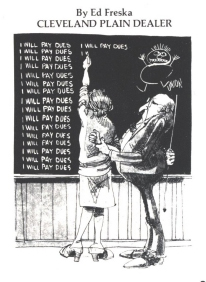Union Monopoly Power Will Bankrupt Illinois
Taxpayers United of America (TUA) today released the results of its second study of the Chicago Teachers’ Pension Fund (CTPF), which reveals many pensioners are on track to collect more than $5 million…

Taxpayers United of America (TUA) today released the results of its second study of the Chicago Teachers’ Pension Fund (CTPF), which reveals many pensioners are on track to collect more than $5 million…

The only thing that ObamaCare offers teacher unions is the possible chance to unionize the likely resulting expansion of school medical personnel. But, it destroys benefits that teachers currently enjoy; you know the teachers that the National Education Association (NEA)…

From the NLRB’s Andrew Martin: Gregory J. King joined the NLRB as Director of the Office of Public Affairs on June 16, 2013. Gregory will advise the Chairman, the Acting General Counsel and other NLRB senior leaders on media relations,…

The American Thinker examines how big teachers union have become impediments for needed education reform: American public education may be in crisis, but teachers are fairly happy with their lives, according to a new Gallup poll: The…
Jesse Jackson had no problem was marching alongside the International Socialist Organization to protest against Rahm Emanuel’s school closings. When a blogger asked about it, he was assaulted: The Chicago Teachers Union and the Chicago Police Department were obviously working in tandem last…
Last year, State Rep. Mike Shirkey (R-Clarklake), a staunch foe of compulsory unionism, led the charge in his chamber of the Michigan Legislature for the Right to Work measure signed into law in December by GOP Gov. Rick Snyder. Among…

Writing for the Orange County Register, Larry Sand, a retired teacher who taught in Los Angeles and NYC public schools for 28…
Simon Campbell’s column defending worker’s choice in union membership is a proposition that is hard to argue against it but union bosses do it everyday of the week: Who should decide whether a union benefits an employee? The…

Just when you think they can't go any lower, the union bosses have filed a lawsuit in Louisiana to force children to attend poor schools. The Wall Street Journal opines on the latest big labor outrage: Here's the bizarre world in which we live: In 2007 Gabriel Evans attended a public school in New Orleans graded "F" by the Louisiana Department of Education. Thanks to a New Orleans voucher program, Gabriel moved in 2008 to a Catholic school. His mother, Valerie Evans, calls the voucher a "lifesaver," allowing him to get "out of a public school system that is filled with fear, confusion and violence." So what is the response of the teachers union? Sue the state to force 11-year-old Gabriel back to the failing school. This week a state court in Baton Rouge is hearing the union challenge to Louisiana's Act 2, which expanded the New Orleans program statewide and allows families with a household income less than 250% of the federal poverty line to get a voucher to escape schools ranked C or worse by the state. Gabriel's voucher covers $4,315 in annual tuition. The tragedy is how many students qualify for the program. According to the state, 953 of the state's 1,373 public schools (K-12) were ranked C, D or F. Under the new program, more than 4,900 students have received scholarships allowing them to attend non-public schools. Enter the teachers unions, which sued this summer to stop the incursion into their rotting enterprise. According to the Louisiana Federation of Teachers and the Louisiana Association of Educators, the voucher program steals money from public schools.